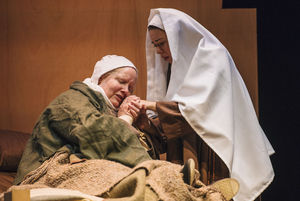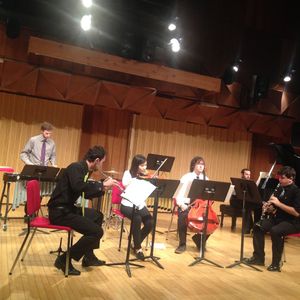By DAVID DUPONT, Sentinel News Editor
Though the mob is at the gate even as “Dialogues of the Carmelites” begins, the true enemy is closer still.
Our heroine Blanche, played by recent Conrad Art Song Competition winner Desiree Nicole Johnson, is almost crippled by nagging, inchoate fear. A servant’s shadow sends her into hysterics. For her each night is akin to Christ’s last night on earth, each morning a new Easter.
Blanche seeks safety and spiritual direction in the convent of the Carmelites. But in a time of revolutionary turmoil, no place is safe, especially given the anti-religious tenor of the mob.
This story of faith and trial in the time of the French Revolution is on stage at the Donnell Theatre in Bowling Green State University’s Wolfe Center for the Arts Friday at 8 p.m. and Sunday at 3 p.m. For tickets, visit bgsu.edu/arts or call the box office at 419-372-8171.
The dialogues of the title are not between the nuns and the revolutionaries but among the sisters themselves. The rabble stays offstage until the end of the second act. While the nuns in rousing song ponder the true nature of faith.
Francis Poulenc wrote “Dialogues of the Carmelites” in the throes of his own rediscovered Catholicism and personal tragedy. He sets these inner reflections to soaring melody set over an orchestra that gives full voice to the uncertainties and terror.
The cast dramatizes this in full voice. Johnson’s Blanche is physically cramped by fear. The contrast between her and the lighthearted Constance (Elizabeth Hood) is notable. Hood is almost flighty, providing the few minutes of anything approaching humor in script. Her very good humor grates on Johnson, who masks her anxiety with piety. Johnson seems to be struggling to hold this within, even as her voice rings out.
Jane Schoonmaker Rodgers brings the dismay of the old prioress, whose faith wavers as she faces death. Her death scene is wrenching as she questions all she’s devoted her life to, flinging aside her rosary.
The new prioress (Esther Darmahkasih) brings the light of faith informed by steadfast leadership in the face of crisis. She would have her sisters avoid martyrdom, but never wavers as they journey toward it. Her rallying aria in the prison is stunning, tender yet firm.
The true guide of the nuns is Mother Marie (Lauren Cornwell). She is the one who brings the sisters together in a vow of martyrdom.
Blanche joins them in that vow only to recoil.
In the end, she realizes the only way to overcome what she fears is to confront it, and finds in the end the resolution she has been seeking.
The orchestra, directed by Emily Freeman Brown, is heavy on the winds. The score uses brass chorales to undergird professions of faith, laced through with dissonance. A particularly lovely clarinet melody floats through a couple scenes, speaking with unspoken eloquence. Percussion startles at points, punctuating the action.
The conflict plays out on a set of large, dark geometric shapes that has the nuns almost glowing as they move about stage.
The production, directed by guest Nicholas Wuehrmann, expands the scope of the drama by evoking 20th and 21st century terror to express the timelessness of collective violence. In each scene the time setting shifts forward, bringing on Nazis, ending with terrorists and an evocation of the killing of the cartoonists at Charlie Hebdo. “Je Suis Charlie” is emblazoned behind the steps leading to the guillotine.
This makes for an ideological mess. The cartoonists of Charlie Hebdo are nothing if not children of the French Revolution, especially its anti-clerical beliefs.
But listeners do not go to opera for philosophical clarity. They go for spectacle, melody and music fueled by passion. BGSU’s “Dialogues of the Carmelites” delivers on all fronts.



